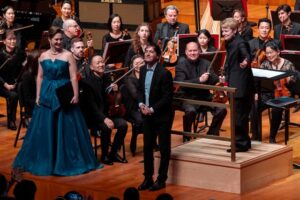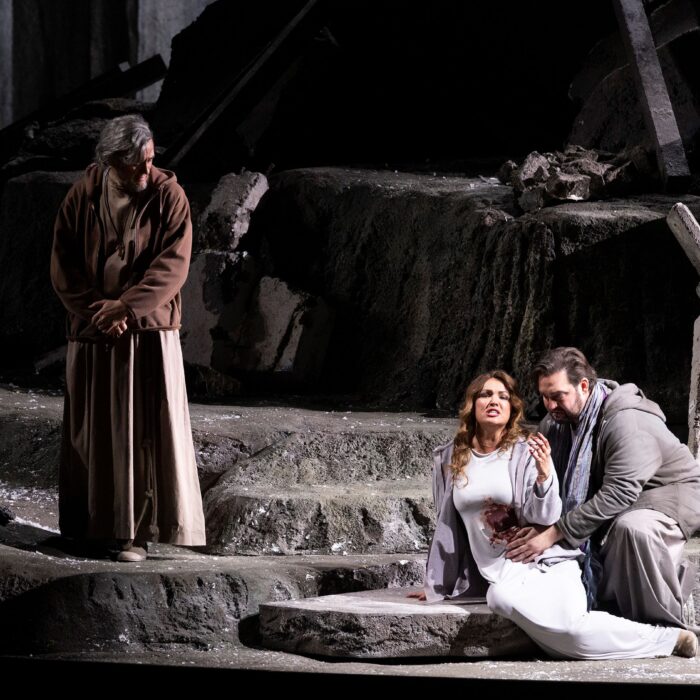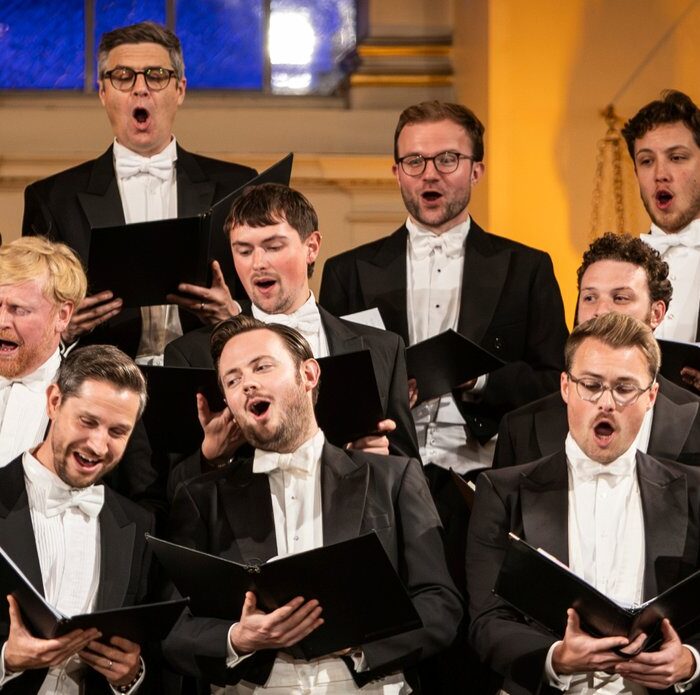
iSING! Festival 2024 Review: Mason Bates’s ‘Spring River Flowers by Moonlight’
Bates’s World Premiere Creates an Evolution in Style to Capture Movement and Light
By Rick PerdianFor the first generation of singers who traveled to China in 2011, I SING BEIJING was something new and adventurous, but also a bit of a lark. That has changed over the intervening years.
On November 2, 2024, the iSING! Festival, as it is now known, and the Philadelphia Orchestra performed under the baton of Marin Alsop at Beijing’s National Center for the Performing Arts (NCPA). In addition to selections from “Echoes of Ancient Tang Poems,” the concert also saw the world premiere of Mason Bates’s “Spring River Flowers by Moonlight,” the Philadelphia Orchestra and Music and Artistic Director Yannick Nezet-Seguin and the China International Culture Association.
Tenor Thomas Glenn, one of the first to participate in iSING! and who sang in the prior evening’s concert, reflected, “We had no idea it would evolve into something like this.”
iSING! Meets the Philadelphia Orchestra
iSING! was founded by the Asian Performing Arts Council headed by Dr. Martha Liao, a former geneticist and one of the earliest scientists to introduce recombinant DNA technology to China. Its artistic director is bass Hao Jiang Tian, who has had a multi-faceted international career, including 20 years with New York’s Metropolitan Opera. iSING!’s mission is to further Mandarin as a lyrical language by training Western singers in its intricacies, creating a body of music in Mandarin in the Western classical style, and introducing young Chinese singers to the rest of the world.
Since its inception, nearly 400 young singers from over 30 countries have participated in iSING! Alums of the program have sung in major opera houses worldwide, including the Berliner Staatsoper, L’opéra de Paris, Metropolitan Opera, San Francisco Opera, and NCPA. They have also appeared in the premieres of modern Chinese operas, including Tang Jianping’s “Voyage to the East” and “Diary of John Rabe,” as well as Guo Wenjing’s “Rickshaw Boy.”
Tian credits former Chinese Consul General Huang Ping for embracing iSING!’s mission and proposing a collaboration with the Philadelphia Orchestra. Over a lunch arranged by Huang in Philadelphia, Tian showed Ryan Fleur, the orchestra’s executive director, video clips of iSING!’s 2020 performance of “Echoes of Ancient Tang Poems” in Suzhou, China. The piece is a collection of settings of classic Chinese lyrical texts by young composers from around the world.
Fleur immediately saw the potential for a collaboration between the two organizations. The outcome was a highly successful Chinese New Year’s Eve concert in 2023 in Philadelphia which featured the North American premiere of “Echoes of Ancient Tang Poems.” It was repeated to a sold-out audience at New York’s Lincoln Center.
iSING! Commissions Mason Bates to Set Classic Tang Poem
Building on the success of that first collaboration, plans were made for a joint concert in Beijing during the orchestra’s Autumn 2024 tour and residency in China. In addition to selections from “Echoes of Ancient Tang Poems,” a new piece would be commissioned for the concert, a setting of the classical Tang dynasty poem “Spring River Flowers by Moonlight.”
The poem, originally considered to be included in the first edition of “Echoes of Ancient Tang Poems,” was shelved for later consideration due to its difficulty. Tian explains that the poem depicts subtle, complex emotions, not vivid, dramatic scenes, such as the drunken soldiers who course through many of the era’s texts. “Spring Flowers by Moonlight” was the obvious choice of the iSING! team that had experience with commissioning and performing new works.
Matías Tarnopolsky, president and CEO of the Philadelphia Orchestra, who will become president and CEO of the New York Philharmonic beginning January 1, 2025, proposed Mason Bates for the commission. Tian was convinced that Bates was the person to set “Spring River Flowers by Moonlight” after watching videos of bass Wei Wu, an iSING! alum, performing in the composer’s 2017 opera, “The (R)evolution of Steve Jobs.” Tian was drawn to Bates’s melodies, sense of line, and simple harmonies, as well as a certain Asian sensibility, or quietude, which the composer brings to his music. The commission was extended to Bates in January 2024, and he accepted.
Although short notice for composing a new work, the timing was good for Bates who was finishing his orchestration of a new opera “The Amazing Adventures of Kavalier and Clay” for the Metropolitan Opera. He had the time to work on something new and welcomed “Spring River Flowers by Moonlight” as a diversion from the task of orchestrating.
Bates describes the poem as a “real stunner” with imagery and a dynamic structure that was new to him. It was also Bates’s first attempt at setting a Mandarin text. He was open to the challenge of creating a musical language that not only worked with the poem, but would connect to a Beijing audience as well.
Unlocking the Subtleties of “Spring River Flowers by Moonlight”
While well-versed in setting the English language, Mandarin posed a new and different challenge for Bates. In English, the focus is on emphasis and line, Bates says, while in Mandarin, it is all about pitch. He notes that the inherent musicality of any language is something that shouldn’t be distorted in setting its words to music. The challenge for a composer, Bates stresses, is to create melodies that work with the natural cadence of a language.
The first thing that Bates did was to discuss “Spring River Flowers by Moonlight” with one of his Chinese students. To his surprise, he learned that it is a very popular poem that the Chinese learn as children. His real understanding of the text and the flow of the language, however, came from working with Tian Hao Jiang and Dr. Martha Liao. In addition to giving him an English translation of the text, they provided him with a quatrain-by-quatrain analysis which proved very useful. Bates says, “I wanted to learn from people who had lived with the poem and Tian and Martha were ideal teachers.”
Bates explains that on its surface, the beginning stanza of the poem appears to be a beautiful pastoral evocation of nature. As the poem unfolds, you realize that it is the story of a soldier in a place far away from his beloved. What starts as happy and beautiful, Bates concludes, becomes tragic in the end.
An Evolution in Style to Capture Movement and Light
“My music for the voice is more melodic than people might expect,” says Bates. He entered the world of music as a choir boy in Richmond, VA. As a result, he approaches the voice as an extension of the body and strives to create melodies with logic when composing art songs, choral works, and operas. It was, of course, the main reason Tian was intrigued with Bates’s work.
Bates doesn’t perceive himself as having a fixed compositional style, but certain musical markers do run through his works. Rhythm is as important as melody to Bates. In “Spring River Flowers by Moonlight,” he creates a sense of movement in the piece, rather than an elegiac one. This is heard from the very start of the piece, as Bates depicted the poem’s images of flowing rivers, the rising moon, and the sparkling waves of the sea in flowing triplets in the harp, piano, and violin.
Another of Bates’s stylistic brushstrokes is his penchant for shimmering, mesmerizing surfaces. Such sounds are heard throughout the work, but especially in the lines of the poem which tell of meandering fields of flowers in the moonlight.
A Special Collaboration with Artists Both New and Known
Bates had no choice in the singers who were to sing the premiere, which is out of the norm for him. He said that it spooked him a bit, not knowing for whom he was writing. Tian found the perfect singers. Bates describes soprano Esther Maureen Kelly and baritone Valdis Jansons as extraordinary. The singers’ voices and musicality were so compatible with Bates’s vocal writing that he needed to make only a few adjustments to accommodate them.
Jansons returns the compliment, saying that Bates knows how to write for the voice. Not only with his placement of higher passages on comfortable vowels, but also in the markings he gives as to the mood he wants. The singer also says that Bates sets the text with great sensitivity by employing sounds that give a more authentic feel to the language.
If composing for unknown singers was a bit outside of Bates’s comfort zone, working with conductor Marin Alsop was another matter. They have been colleagues for 15 years, including five years at the Cabrillo Festival of Contemporary Music in Santa Cruz, CA, where Alsop served as music director from 1992 to 2016. Bates said that it is special to collaborate with Alsop on a vocal project, as not every conductor can work with voices as she can.
The Philadelphia Orchestra will give the North American premiere of “Spring River Flowers by Moonlight” at its annual Lunar New Year concert on January 10, 2025, in Marian Anderson Hall at the Kimmel Center for the Performing Arts. Naomi Woo will conduct with Kelly and Jansons returning as soloists.
For Jansons, the experience of preparing Bates’s new piece epitomized the iSING! experience. He quotes Katherine Chu, iSING!’s Music Director: “It’s not enough to just do the music, respecting the markings and dynamics. It is about understanding and eliciting emotions. Otherwise, why would you do it at all?” – an ethos shared by everyone involved in the making of “Spring River Flowers by Moonlight.”
Categories
Reviews


